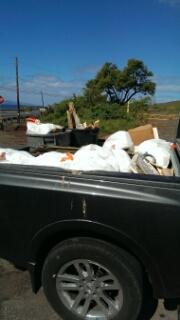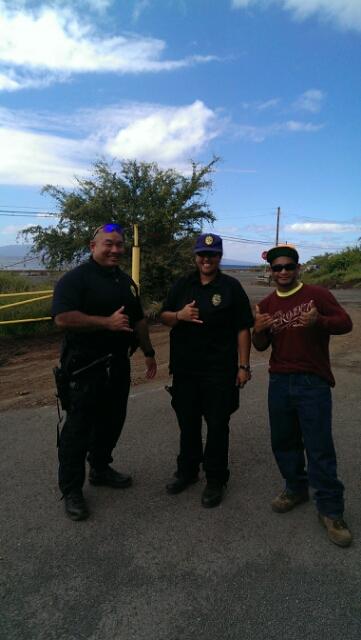Maui Drivers Reminded of Uncovered Truck Law

An example of a truck in violation of HRS 291C-131 that states truck beds carrying loose items must be covered to keep rubbish from flying out onto the roads. Courtesy photo, Mālama Maui Nui.
By Wendy Osher
An informational demonstration was held over the weekend at the Olowalu Recycling and Refuse Convenience Center to educate motorists on the state’s law regarding uncovered truck loads.
The event, hosted by Mālama Maui Nui, in partnership with the County of Maui and the Maui Police Department, sought to educate the public on the safety and environmental hazards that occur when debris flies out of uncovered truck beds and onto island roadways.
Because the demonstration was an educational event, no one was cited; however, organizers say that out of the 78 vehicles checked over a four hour period, only 30 had properly covered their loads, and 48 vehicles were found to be in violation.
Under state law motorists are required to secure loads traveling on a highway.

MPD Officers Kean Uyehara and Edith Quintero accompanied by CWD Road Crew staff Stacy Panlasigui. The team of four (CWD Road Crew staff Kaulana Saltiban not pictured) spoke with 78 vehicles during their four-hour demonstration about HRS 291C-131. Courtesy photo, Mālama Maui Nui.
The law states that loads must be “entirely covered” by a cargo net, tarpaulin, canopy, or other material designed to prevent the load from escaping from the vehicle. This applies to the transport of loose rubbish and paper, plastics, empty cartons, dirt, sand and gravel.
First time violators can be fined anywhere between $250 to $500. A second violation within a year can cost a motorist between $500 and $750, plus temporary license or vehicle registration suspension for at least five days.
Organizers say that in addition to the moving hazard airborne trash can cause, it also results in hefty littering with more than 82,000 pounds of litter picked up along roadways by Mālama Maui Nui community work day volunteers last year.
Officers participating in the event included Edith Quintero and Kean Uyehara. They were joined by Mālama Maui Nui community work day crew and staff members.
Video captured from an on-board bus camera on Maui last week showed a surfboard becoming airborne from another vehicle and crashing through the front windshield of a Maui Bus in Launiupoko.
While it was not specified if the load came from a vehicle or a truck, transportation officials say the item was not secured well enough and, “If it wasn’t for the bike rack (on the bus) the driver could have been seriously injured.”




_1768613517521.webp)


